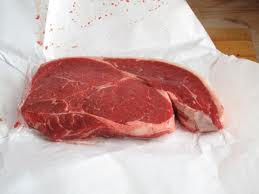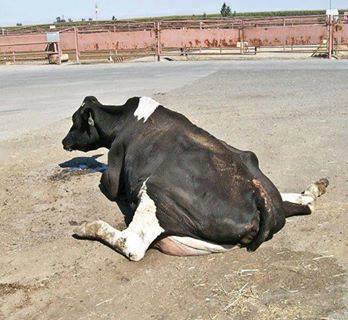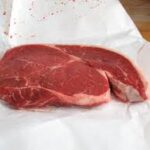Factory Farming Evil – Part 1
Factory Farming Evil – Part 1 – I don’t know the author of this particular piece (I wish I did). I have seen it on social media more than once and I thank whoever wrote it for the courage to put this savage suffering into words. This is a story that needs to be told – read – shared and re-shared. This is an example of the price that animals pay for our selfish ignorance. I like to think of this beautiful cow as “Hope” – may she never be forgotten!
“Have you ever been down? Have you ever had pain and you were ignored. Have you experienced suffering so obvious but everyone around you was oblivious. You were left to suffer and be in pain still nothing was done. Anything that has flesh, bones, blood and nerves can feel pain. Don’t make distinctions between animal or human. The only difference is the ability to express pain through speech or not.
Read this story and please share it as much as possible. I beg you to share it and create awareness. May it go viral.
NEVER EAT, HARM OR KILL ANIMALS.
A Downed Cow’s Story
“The truck carrying this cow was unloaded at Walton Stockyards in Kentucky one September morning. After the other animals were removed rom the truck, she was left behind, unable to move. Stockyard workers used customary electric prods in her ear to try to get her out of the truck, then they beat her and kicked her in the face, ribs, and back, but she still didn’t move. They tied a rope around her neck, tied the other end to a post in the ground, and drove the truck away. The cow was dragged along the floor of the truck and fell to the ground, breaking both her hind legs and her pelvis in the process. She remained this way until 7:30 that evening.
For the first three hours, she lay in the hot sun crying out. Periodically, when she urinated or defecated, she used her front legs to drag herself along the gravel roadway to a clean spot. She also tried to crawl to a shaded area, but she was unable to move far enough. Altogether, she only managed to crawl about 13 and 14 yards. The stockyard employees wouldn’t allow her any drinking water – the only water she received was given to her by Jessie Pierce – a local animal rights activist. After she was contacted by a woman who witnessed the incident, Jessie arrived at noon. Stockyard workers did not cooperate to help her, so she called the Kenton County police. A police officer arrived but was instructed by his superiors to do nothing. He left at 1 p.m.
The stockyard operator informed Jessie that he had permission from the insurance company to kill the cow but wouldn’t do it until Jessie left. Although doubtful that he would keep his word, Jessie left at 3. She returned at 4:30 and found the stockyard deserted. Three dogs were attacking the cow, who was still alive. She had suffered a number of bite wounds, and her drinking water had been removed. Jessie contacted the state police. Four officers arrived at 5:30. State trooper Jan Wuchner wanted to shoot the cow but was told that a veterinarian should kill her. The facility’s two veterinarians would not euthanize her; they claimed that in order to preserve the value of the meat, the cow could not be destroyed. A butcher eventually arrived at 7:30 and shot the cow. Her body was purchased for $307.50.
When the stockyard operator was questioned by a reporter from The Kentucky Post, he stated, “We didn’t do a damned thing to it” and referred to the attention given to the cow by humane workers and police as “bullcrap”. He laughed throughout the interview, saying that there was nothing wrong with the way that the cow was treated.
This is NOT an isolated case. It is so common that animals in this condition are known in the meat industry as “downers”. According to the meat industry’s own statistics, each year, millions of chickens, turkeys, pigs, and cows arrive at the slaughterhouse either dead or too sick or injured to walk. The animals become severely crippled or ill after a lifetime of abuse in factory farms and a very difficult journey to the slaughterhouse, during which they are shipped through all weather extremes without any food or water.
Factory farms don’t provide individualized medical care or humane euthanasia to sick animals. It’s cheaper to let the animals suffer and eventually die. The suffering caused by the meat, egg, and dairy industries’ cost-cutting measures is enormous. The egg industry, for example, confines between five and 11 birds to small wire battery cages, despite the fact that the extreme crowding causes some of the birds to get sick and die. Egg-industry expert Bernard Rollin sums up the simple, cold-hearted reasoning of egg factory-farm operators by saying that “chickens are cheap, cages are expensive”.
After PETA brought much-needed attention to this issue, the Kenton County Police Department adopted a policy requiring that euthanasia be performed on all downed animals immediately, whether they are on the farm, in transit, or at the slaughterhouse. Many other law enforcement agencies don’t have such policies, and downed animals continue to suffer everywhere. It is up to the public to demand change in how the meat, egg, and dairy industries treat animals, and it is up to consumers to refuse to purchase the products of this miserable industry. Otherwise, many more animals will continue to suffer the same agonizing fate of this nameless cow”.
What You Can Do – Please, help prevent unnecessary suffering by adopting a vegan diet. Eating dairy, eggs, meat, honey or other animal products and by products is unnecessary and causes the death of billions of innocent animals each year and environmental damage. A single person eating a vegan diet saves more than 500 animals each year.”
A Personal Note: – This particular photo haunts me. May “Hope” know that millions of us are fighting in her memory – Rosemary Wright.



